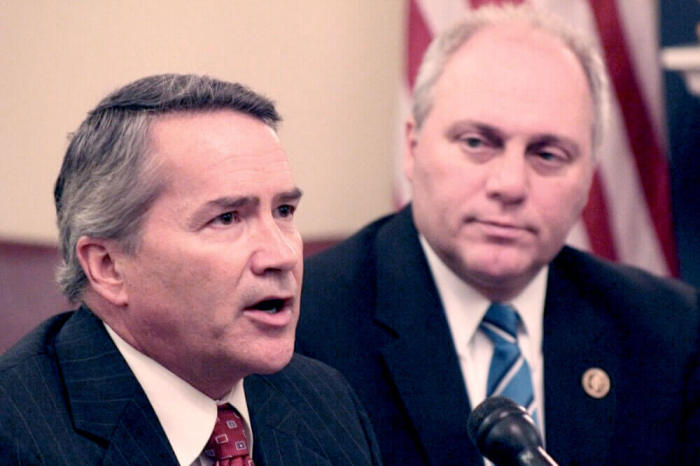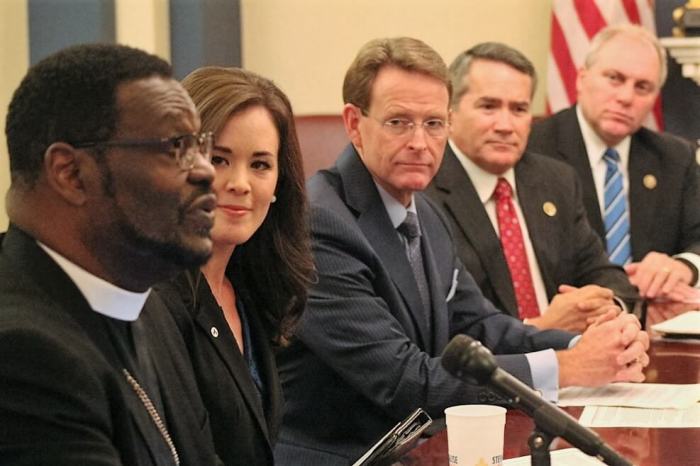New Bill Would Repeal Johnson Amendment, Protect Pastors Rights to Endorse Candidates, Political Positions

WASHINGTON — House Majority Whip Steve Scalise, R-La., introduced legislation Wednesday that would reinstate pastors' and churches' rights to speak freely on political matters and would allay major religious liberty and free speech concerns caused by the Johnson Amendment.
As thousands of pastors across the nation get ready to partake in the annual "Pulpit Freedom Sunday" on Oct. 2, Scalise and Rep. Jody Hice, R- Ga., introduced the "Free Speech Fairness Act," which would eliminate the longstanding threat of churches and nonprofit organizations being stripped of their tax-exempt statuses or fined if they speak publicly about public policy or endorse candidates for public office.
The bill, also known as H.R. 6195, comes as Republican presidential nominee Donald Trump has drawn the appeal of social conservatives and evangelicals by vowing to repeal the Johnson Amendment, which was passed in 1954 and has allowed the IRS to intimidate and censor churches and other nonprofit organizations.
"For decades now, the Johnson Amendment has limited the ability for a lot of churches and religious organizations and nonprofits to express their views and to exercise their free speech rights and exercise the religious liberty that is one of the hallmarks of our Constitution," Scalise said during a press conference at the United States Capitol on Wednesday.
"Under president Obama, the IRS formed a committee to aggressively go after churches and other religious organizations using the Johnson Amendment of 1954 to limit their free speech," he continued. "Since then, we have identified 99 cases already where churches have been flagged for potential violations of the law. And, the federal government, through the IRS, is now going after churches."
According to a fact sheet provided by Scalise's office, the bill would ensure that ministers and other religious leaders can legally make comments about a political candidate or political issue as part of his or her sermon without having to fear IRS ramifications. The bill would also allow for churches and charities to include comments on political issues or candidates in their newsletters but would not allow for them to establish a new direct mail campaign to distribute political information.
The bill only protects the rights of churches and nonprofits "so long as they are made in the ordinary course of the organization's regular and customary activities in carrying out its exempt purpose."
"It does not allow nonprofits to become political operatives or fronts for political operations," Family Research Council President Tony Perkins, who supports the legislation, explained at the press conference. "Therefore, if it is within the scope of their normal activities, that is fine. You can make a statement. You can make an endorsement, but you cannot be a front for political operation, meaning that you turn tax-exempt money into political funds."
"Expenditures are restricted in terms of you can't go beyond what would be your normal course but you're free speech rights are restored," Perkins added. "As a nonprofit or a church, you can speak to the issues."
Hice, who is also a Southern Baptist pastor, explained that the simple threat of IRS enforcement of the Johnson Amendment causes churches and pastors to essentially "self-censor" themselves.
"I would just like to say as a pastor from my personal experience, just the threat of the IRS potentially taking away tax-exempt status is enough to cause pastors and nonprofits to self-censor themselves right out of the game," Hice said. "That is what has taken place. Every election cycle, I would receive letters and great threats and intimidations about how we could be facing a potential lawsuit or removal of our tax-exempt status. Just about every church receives those kinds of letters every election cycle."

Bishop Harry Jackson of the Hope Christian Church in Maryland recalled a time years ago when he hosted a Martin Luther King Day event where he invited Republican and Democrat politicians to speak. Jackson said he received a letter from the IRS claiming that he was advocating for a particular candidate.
Additionally, Jackson told CP about how he would get backlash when he used to speak on local radio stations.
"People would come on and say, 'Stay within the walls of the church!' Many of those folks talking are African-American. I thought, how ironic is it that they wouldn't have the freedom they now have had it not been for an organized church speaking on social issues," Jackson, who is also African-American, said. "But there has kind of been a brainwashing of the average citizen that 'We shouldn't touch these things.' I think politics, as a whole arena, is where we are to be held accountable to God for where the culture goes."
As time is running out before the legislative session ends in mid-December and the bill is likely to face opposition from President Barack Obama and Senate Democrats, the likelihood of the legislation passing and becoming law before it needs to be reintroduced next January is slim.
Scalise said the point of introducing the bill now was to help facilitate more discussion about religious freedom and free speech as the 2016 election heats up.
"We would like the country, as we are electing a new president, to ask this question: 'Will the next president support legislation like this and restore religious freedom or are they going to continue the policies that we've seen under Barack Obama of aggressively attacking religious freedom?'" Scalise asked. "As [Congress is] getting ready to leave, you are going to see the presidential campaign completely take over the public discourse and hopefully this becomes part of that discussion."




























